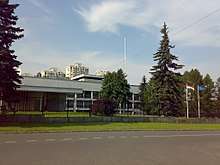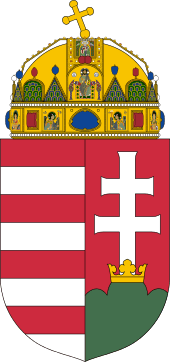Hungary–Russia relations
Hungary–Russia relations refer to bilateral foreign relations between the two countries, Hungary and Russia. After the Second World War, Hungary and the Soviet Union became economic and military allies; both were signatories of the Warsaw Pact. The relations between both countries were damaged in 1956 due to the Soviet intervention in the revolution occurring in Hungary. However both countries reestablished diplomatic relations after the breakup of the USSR.
 | |
Hungary |
Russia |
|---|---|

Hungary has an embassy in Moscow and two consulate-generals (in Saint Petersburg and Yekaterinburg). Russia has an embassy in Budapest and a consulate-general in Debrecen.
Both countries are full members of the Council of Europe and the Organization for Security and Co-operation in Europe.
History
Hungary and the Soviet Union
Hungary |
Soviet Union |
|---|---|
The People's Republic of Hungary (Magyar Népköztársaság) was the official state name of Hungary from 1949 to 1989 during its Communist period under the guidance of the Soviet Union. Following the Soviet occupation of Hungary after World War II, the Soviets set up a police system that persecuted all opposition through direct force and propaganda, hoping this would lead to a Communist victory in the elections of 1946 .[1] Despite these efforts, the Hungarian Communist Party came in third place in the elections, prompting the Soviets to directly impose a puppet government the following year. The next few years were spent consolidating power, using the ÁVH secret police to suppress political opposition through intimidation, false accusations, imprisonment and torture.[2] The worst of the repression came under the rule of Mátyás Rákosi. At the height of his rule, Rákosi developed a strong cult of personality.[3] Dubbed the "bald murderer", Rákosi imitated Stalinist political and economic programs, resulting in Hungary experiencing one of the harshest dictatorships in Europe.[4][5] He described himself as "Stalin's best Hungarian disciple"[3] and "Stalin's best pupil".[6] After Khrushchev's "Secret Speech" denouncing Stalin's cult of personality, Rákosi was ultimately removed from power and replaced by the reformist Imre Nagy, who attempted to take Hungary out of the Soviet bloc. This led to the Hungarian Revolution of 1956, which was brutally crushed by the Soviets. Following the crushing of the revolution, the Soviets instituted János Kádár as the leader of Hungary. After an initial period of repressions against the revolutionaries, Kádár implemented a more moderate form of communism, which he referred to as "Goulash Communism." He would rule until 1988, when he was removed from power just before the "revolution" that ended Communism in Hungary.
Hungary and the Russian Federation
Since 1991, Hungarian-Russian relations have improved constantly. This improvement has increased in part due to the election of Prime Minister Viktor Orbán in 2010 and the announcement of his foreign relations plan, the "Eastern Opening Policy." Created in opposition to Hungary's Western coalitions such as the European Union, NATO, and the United Nations, the Eastern Opening plan heavily prioritized Russia as a viable ally, and efforts were taken to secure that tight relationship throughout 2013-2014.[7] One major proof of this is the bilateral agreement signed by the two nations over the nuclear plant Paks in Hungary, which calls into the question the risk of Hungary becoming financially dependent on Russia for more than a few decades.[7]
Following the Russian military intervention in Ukraine in 2014, Prime Minister Viktor Orbán rejected the Russian sanctions despite European Union pressure. This has led outside officials in the EU and NATO to accuse Hungary as a "Trojan Horse", acting ultimately in the interests of Russia.[7]
In 2017, Vladimir Putin visited Budapest to meet with Orbán to discuss bilateral ties.[8] As a response to the reaction to the poisoning of Sergei and Yulia Skripal in the United Kingdom, in April 2018, one Hungarian embassy staffer was expelled from Russia.[9] In May 2019, concerned over the tightening relations between Hungary, Russia, and also China, the Trump administration hosted Orbán in D.C, raising criticism from the EU and UN.[10]
References
- Wettig, Gerhard (2008), Stalin and the Cold War in Europe, Rowman & Littlefield, p. 51, ISBN 978-0-7425-5542-6
- UN General Assembly Special Committee on the Problem of Hungary (1957) "Chapter II.N, para 89(xi) (p. 31)" (PDF). (1.47 MiB)
- Sugar, Peter F., Peter Hanak and Tibor Frank, A History of Hungary, Indiana University Press, 1994, ISBN 0-253-20867-X, page 375-77
- Granville, Johanna, The First Domino: International Decision Making during the Hungarian Crisis of 1956, Texas A&M University Press, 2004. ISBN 1-58544-298-4
- Gati, Charles, Failed Illusions: Moscow, Washington, Budapest, and the 1956 Hungarian Revolt, Stanford University Press, 2006 ISBN 0-8047-5606-6, page 9-12
- Matthews, John P. C., Explosion: The Hungarian Revolution of 1956, Hippocrene Books, 2007, ISBN 0-7818-1174-0, page 93-4
- Végh, Zsuzsanne (2015). ""Hungary's "Eastern Opening" Policy Toward Russia: Ties that Bind?"". International Issues & Slovak Foreign Policy Affairs. 24: 47–65. ProQuest 1721339167.
- "Why Putin needs Orbán; Russia looks to Budapest and the new Trump reality to bring down sanctions wall". politico.eu.
- https://en.trend.az/world/russia/2882113.html
- GRAMER, ROBBIE; MACKINNON, AMY (May 1, 2019). "To Counter China and Russia, U.S. Mulls Inviting Hungary's Orban to D.C." Foreign Policy. Retrieved November 5, 2019.
External links
| Wikimedia Commons has media related to Relations of Hungary and Russia. |

